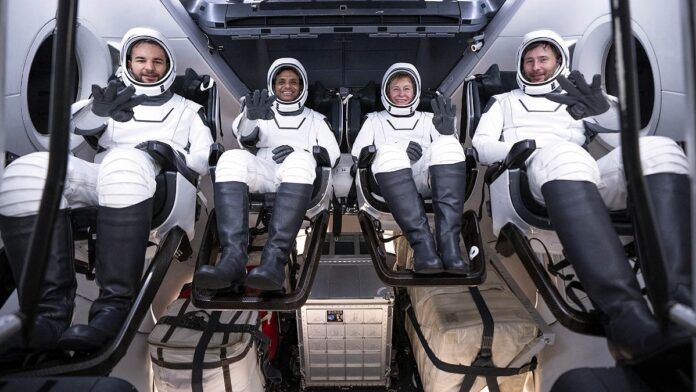The Axiom Mission 4 (Ax-4) crew, which includes Group Captain Shubhanshu Shukla, the Indian Air Force pilot and astronaut representing ISRO, is scheduled to return to Earth from the International Space Station (ISS) on July 14, according to an official announcement by Axiom Space Inc.
Article Contents
The mission, originally designed for a two-week stay aboard the orbital laboratory, was extended slightly due to operational and weather-related factors. The Ax-4 mission, launched by Axiom Space aboard SpaceX’s Dragon spacecraft, has been a groundbreaking venture in commercial and international space collaboration, including participation from India, the United States, Poland, and Hungary.
Scheduled Return: July 14, Weather Permitting
As per the official update shared by Axiom Space on social media, “Pending favorable weather conditions, the Ax-4 crew is scheduled to undock from the ISS no earlier than Monday, July 14 at 7:05 a.m. ET (4:35 p.m. IST).”
The returning crew includes:
-
Commander Peggy Whitson (USA)
-
Pilot Shubhanshu “Shux” Shukla (India)
-
Mission Specialist Slawosz “Suave” Uznański-Wiśniewski (Poland)
-
Mission Specialist Tibor Kapu (Hungary)
Their mission onboard the ISS involved over 60 scientific experiments representing 31 countries, focused on space medicine, technology demonstration, Earth observation, and human performance in microgravity.
?? India’s Shubhanshu Shukla: A Proud Moment for ISRO
Group Captain Shubhanshu Shukla, a test pilot with the Indian Air Force and a payload specialist on the Ax-4 mission, has become a symbol of India’s growing role in human space exploration. Representing the Indian Space Research Organisation (ISRO), Shukla conducted seven India-designed microgravity experiments and collaborated on five joint ISRO-NASA projects.
His role was critical in advancing scientific understanding in several domains including:
-
Microalgae growth in space
-
Human cognitive performance in microgravity
-
VR-assisted attention and stress monitoring
-
Biofuel potential in closed-loop ecosystems
On Day 15 of the mission, Shukla was observed continuing work on the microalgae experiment, which involves deploying and stowing biological samples. These studies aim to assess how algae can be used to produce food, oxygen, and biofuels for long-duration space missions.
Highlights from Axiom Mission 4 (Ax-4) Experiments
Since docking on June 26, 2025, aboard the SpaceX Dragon spacecraft ‘Grace’, the Ax-4 crew has been engaged in an intensive research agenda.
Some of the prominent experiments include:
1. Voyager Displays Eye Movement Study
This study investigates how spaceflight affects ocular movement, motor coordination, and balance. The astronauts, including Shukla, donned VR headsets and neural monitoring caps to evaluate the influence of microgravity on the human nervous system.
2. ISRO-NASA Microgravity Collaborations
Jointly conducted with NASA, these experiments explored everything from material science to microbial resistance in zero gravity. The collaborative approach emphasizes India’s growing participation in global space science networks.
3. Outreach and Education
Beyond science, the Ax-4 crew also participated in live educational broadcasts and virtual classroom sessions, engaging students from around the world in STEM education, including several schools in India, Poland, and Hungary.
Spaceflight with Purpose: What Makes Ax-4 Special?
The Ax-4 mission is the fourth commercial astronaut mission to the ISS conducted by Axiom Space, in collaboration with NASA and SpaceX. Unlike traditional government missions, these flights are privately organized, though they serve high-priority research and global outreach objectives.
With astronauts from four countries, Ax-4 marked a new level of international collaboration in low Earth orbit science. Each crewmember brought unique scientific goals, cultural representation, and technical expertise.
For ISRO, Shukla’s participation lays groundwork for India’s future human spaceflight missions, especially as the country prepares for Gaganyaan, its own upcoming manned mission scheduled for late 2025 or early 2026.
Global Impact: From Space to Earth
The Ax-4 team’s research is expected to have far-reaching benefits, not only for space exploration but also for life on Earth. Studies on biological systems, material behaviors, and human physiology under microgravity conditions help improve:
-
Medical treatments
-
Clean energy solutions
-
Resilient food systems
-
Cognitive health management
Axiom Space emphasized that the mission’s insights could shape the future of long-term space exploration and improve life on Earth, especially in remote or extreme environments.
Mission Timeline Overview
| Date | Event |
|---|---|
| June 26, 2025 | Ax-4 crew docked at the ISS |
| July 10, 2025 | Original mission duration (14 days) ends |
| July 14, 2025 | Rescheduled undocking and Earth return (pending weather) |
What’s Next for Shubhanshu Shukla and ISRO?
After a successful mission, Shubhanshu Shukla is expected to undergo post-mission debriefings and health evaluations. His performance and experiment outcomes will play a crucial role in shaping ISRO’s manned mission strategy for Gaganyaan.
This mission also cements Shukla’s position as a pioneer in Indian spaceflight history, following in the footsteps of Rakesh Sharma, India’s first astronaut.
The return of Indian astronaut Shubhanshu Shukla on July 14 from the International Space Station marks a significant milestone in India’s space journey. His involvement in the Ax-4 mission showcases India’s scientific capabilities and growing footprint in international space collaboration.
With over 60 experiments, including a dozen directly involving ISRO, the mission reflects a strong convergence of research, innovation, and global partnership in space science. As Ax-4 concludes, it leaves behind a legacy of learning, and a future full of possibilities.




